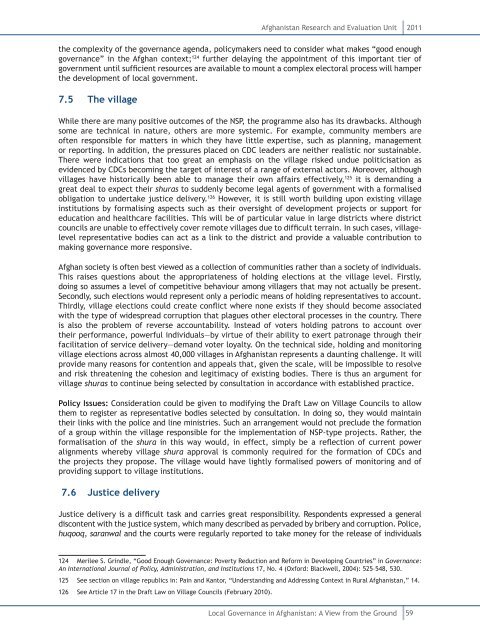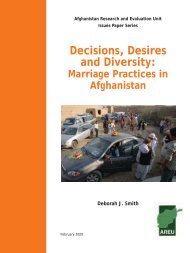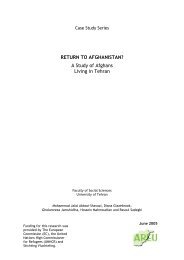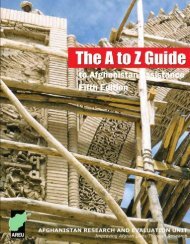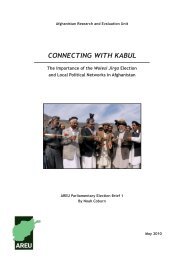Local Governance in Afghanistan: A View from the Ground
Local Governance in Afghanistan: A View from the Ground
Local Governance in Afghanistan: A View from the Ground
- No tags were found...
You also want an ePaper? Increase the reach of your titles
YUMPU automatically turns print PDFs into web optimized ePapers that Google loves.
<strong>Afghanistan</strong> Research and Evaluation Unit<br />
2011<br />
<strong>the</strong> complexity of <strong>the</strong> governance agenda, policymakers need to consider what makes “good enough<br />
governance” <strong>in</strong> <strong>the</strong> Afghan context; 124 fur<strong>the</strong>r delay<strong>in</strong>g <strong>the</strong> appo<strong>in</strong>tment of this important tier of<br />
government until sufficient resources are available to mount a complex electoral process will hamper<br />
<strong>the</strong> development of local government.<br />
7.5 The village<br />
While <strong>the</strong>re are many positive outcomes of <strong>the</strong> NSP, <strong>the</strong> programme also has its drawbacks. Although<br />
some are technical <strong>in</strong> nature, o<strong>the</strong>rs are more systemic. For example, community members are<br />
often responsible for matters <strong>in</strong> which <strong>the</strong>y have little expertise, such as plann<strong>in</strong>g, management<br />
or report<strong>in</strong>g. In addition, <strong>the</strong> pressures placed on CDC leaders are nei<strong>the</strong>r realistic nor susta<strong>in</strong>able.<br />
There were <strong>in</strong>dications that too great an emphasis on <strong>the</strong> village risked undue politicisation as<br />
evidenced by CDCs becom<strong>in</strong>g <strong>the</strong> target of <strong>in</strong>terest of a range of external actors. Moreover, although<br />
villages have historically been able to manage <strong>the</strong>ir own affairs effectively, 125 it is demand<strong>in</strong>g a<br />
great deal to expect <strong>the</strong>ir shuras to suddenly become legal agents of government with a formalised<br />
obligation to undertake justice delivery. 126 However, it is still worth build<strong>in</strong>g upon exist<strong>in</strong>g village<br />
<strong>in</strong>stitutions by formalis<strong>in</strong>g aspects such as <strong>the</strong>ir oversight of development projects or support for<br />
education and healthcare facilities. This will be of particular value <strong>in</strong> large districts where district<br />
councils are unable to effectively cover remote villages due to difficult terra<strong>in</strong>. In such cases, villagelevel<br />
representative bodies can act as a l<strong>in</strong>k to <strong>the</strong> district and provide a valuable contribution to<br />
mak<strong>in</strong>g governance more responsive.<br />
Afghan society is often best viewed as a collection of communities ra<strong>the</strong>r than a society of <strong>in</strong>dividuals.<br />
This raises questions about <strong>the</strong> appropriateness of hold<strong>in</strong>g elections at <strong>the</strong> village level. Firstly,<br />
do<strong>in</strong>g so assumes a level of competitive behaviour among villagers that may not actually be present.<br />
Secondly, such elections would represent only a periodic means of hold<strong>in</strong>g representatives to account.<br />
Thirdly, village elections could create conflict where none exists if <strong>the</strong>y should become associated<br />
with <strong>the</strong> type of widespread corruption that plagues o<strong>the</strong>r electoral processes <strong>in</strong> <strong>the</strong> country. There<br />
is also <strong>the</strong> problem of reverse accountability. Instead of voters hold<strong>in</strong>g patrons to account over<br />
<strong>the</strong>ir performance, powerful <strong>in</strong>dividuals—by virtue of <strong>the</strong>ir ability to exert patronage through <strong>the</strong>ir<br />
facilitation of service delivery—demand voter loyalty. On <strong>the</strong> technical side, hold<strong>in</strong>g and monitor<strong>in</strong>g<br />
village elections across almost 40,000 villages <strong>in</strong> <strong>Afghanistan</strong> represents a daunt<strong>in</strong>g challenge. It will<br />
provide many reasons for contention and appeals that, given <strong>the</strong> scale, will be impossible to resolve<br />
and risk threaten<strong>in</strong>g <strong>the</strong> cohesion and legitimacy of exist<strong>in</strong>g bodies. There is thus an argument for<br />
village shuras to cont<strong>in</strong>ue be<strong>in</strong>g selected by consultation <strong>in</strong> accordance with established practice.<br />
Policy Issues: Consideration could be given to modify<strong>in</strong>g <strong>the</strong> Draft Law on Village Councils to allow<br />
<strong>the</strong>m to register as representative bodies selected by consultation. In do<strong>in</strong>g so, <strong>the</strong>y would ma<strong>in</strong>ta<strong>in</strong><br />
<strong>the</strong>ir l<strong>in</strong>ks with <strong>the</strong> police and l<strong>in</strong>e m<strong>in</strong>istries. Such an arrangement would not preclude <strong>the</strong> formation<br />
of a group with<strong>in</strong> <strong>the</strong> village responsible for <strong>the</strong> implementation of NSP-type projects. Ra<strong>the</strong>r, <strong>the</strong><br />
formalisation of <strong>the</strong> shura <strong>in</strong> this way would, <strong>in</strong> effect, simply be a reflection of current power<br />
alignments whereby village shura approval is commonly required for <strong>the</strong> formation of CDCs and<br />
<strong>the</strong> projects <strong>the</strong>y propose. The village would have lightly formalised powers of monitor<strong>in</strong>g and of<br />
provid<strong>in</strong>g support to village <strong>in</strong>stitutions.<br />
7.6 Justice delivery<br />
Justice delivery is a difficult task and carries great responsibility. Respondents expressed a general<br />
discontent with <strong>the</strong> justice system, which many described as pervaded by bribery and corruption. Police,<br />
huqooq, saranwal and <strong>the</strong> courts were regularly reported to take money for <strong>the</strong> release of <strong>in</strong>dividuals<br />
124 Merilee S. Gr<strong>in</strong>dle, “Good Enough <strong>Governance</strong>: Poverty Reduction and Reform <strong>in</strong> Develop<strong>in</strong>g Countries” <strong>in</strong> <strong>Governance</strong>:<br />
An International Journal of Policy, Adm<strong>in</strong>istration, and Institutions 17, No. 4 (Oxford: Blackwell, 2004): 525–548, 530.<br />
125 See section on village republics <strong>in</strong>: Pa<strong>in</strong> and Kantor, “Understand<strong>in</strong>g and Address<strong>in</strong>g Context <strong>in</strong> Rural <strong>Afghanistan</strong>,” 14.<br />
126 See Article 17 <strong>in</strong> <strong>the</strong> Draft Law on Village Councils (February 2010).<br />
<strong>Local</strong> <strong>Governance</strong> <strong>in</strong> <strong>Afghanistan</strong>: A <strong>View</strong> <strong>from</strong> <strong>the</strong> <strong>Ground</strong><br />
59


